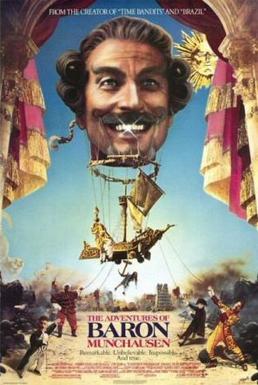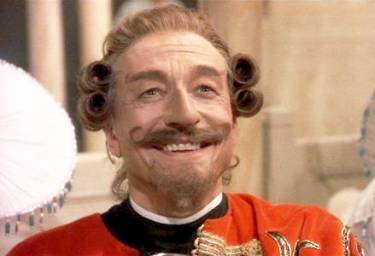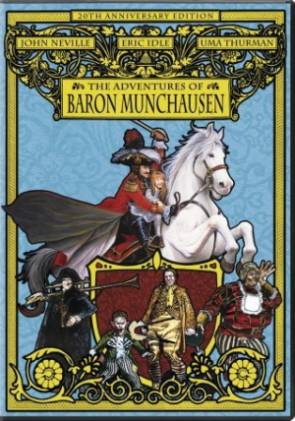So you go to the vending machine to buy a candy bar. And as you’re deciding what to pick, you notice that the candy bar in slot B5 is hanging there by the edge of the wrapper. Do you run and tell management? Do you call the service 800 number on the side of the machine? Hell no. You put in your money, press B5, you get two candy bars for the price of one, and you walk out of there quickly with a stupid grin on your face hoping nobody else sees you. Congratulations, son — you just pulled one over on the Man.
 I felt like that in 1989 when I saw Terry Gilliam’s masterpiece The Adventures of Baron Munchausen.
I felt like that in 1989 when I saw Terry Gilliam’s masterpiece The Adventures of Baron Munchausen.
My friends and I had been weaned on Monty Python, we could recite long passages from The Hitchhiker’s Guide to the Galaxy, we worshiped both Time Bandits and Brazil. So we had some idea of what to expect from a new Terry Gilliam film: visual surrealism, distrust of authority, antipathy to soulless reason, and a skewed sense of humor, among (many) other things. Pure chocolate-covered chaos covered in shiny tinfoil and encased in a neat plastic wrapper.
But Baron Munchausen was something else altogether. Imagine if someone tried to film Peter Jackson’s The Return of the King — without the benefit of CGI. It’s that grand of a scale. Gilliam gives us real armored elephants, ornately carved cannons, and hundreds upon hundreds of fully costumed soldiers engaging in mock battle. He gives us baroque, lovingly crafted setpieces and clockwork monsters that look like Muppets. He gives us cameos from Sting and Robin Williams, not to mention a stark naked Uma Thurman. There’s a story within a story within a story, with allusions to everything from Greek mythology to 1001 Nights.
My friends and I watched Munchausen with jaws dropped. Some Hollywood assholes had paid tens and tens of millions of dollars to make this movie. It was, at the time, one of the most expensive films ever made. And here we sat, on a Saturday afternoon, the day after opening — in Southern California, no less, the movie capital of the world — and there were less than 20 people in the audience.
This wasn’t supposed to happen. Someone had screwed up, and screwed up big time. I mean, of course if you’re running a Hollywood movie studio, you don’t give a mad genius like Terry Gilliam a blank check and virtually no adult supervision. Of course you don’t bet that an 126-minute postmodern retelling of an obscure 18th century German novel starring some British Shakespearean actor nobody’s ever heard of is going to do boffo box office.
Yet someone did. And we, a bunch of 16- and 17-year-old kids, got to reap the benefits. We left the theater giddy, feeling like we had come away from the vending machine with two candy bars for the price of one.
 The Adventures of Baron Munchausen became one of those Hollywood object lessons in bad producing. The Wikipedia article for the movie tells me that the film cost $46.63 million to make (twice the original budget) and only brought in around $8 million in return. If I’m reading this box office chart from the week of May 12, 1989 correctly, the movie actually debuted at #21 in the weekend’s box office. It debuted on 117 screens nationwide. Contrast that to The Return of Swamp Thing, a B-movie from Miramax with a budget of probably a few hundred thousand, which debuted the same weekend on 123 screens.
The Adventures of Baron Munchausen became one of those Hollywood object lessons in bad producing. The Wikipedia article for the movie tells me that the film cost $46.63 million to make (twice the original budget) and only brought in around $8 million in return. If I’m reading this box office chart from the week of May 12, 1989 correctly, the movie actually debuted at #21 in the weekend’s box office. It debuted on 117 screens nationwide. Contrast that to The Return of Swamp Thing, a B-movie from Miramax with a budget of probably a few hundred thousand, which debuted the same weekend on 123 screens.
So Baron Munchausen pretty much stank up the box office. And it hasn’t really even become a huge cult hit on video either, despite what Wikipedia says. It’s not one of those films like The Princess Bride or Blade Runner that went on from modest beginnings to become an enormous word-of-mouth success. This film isn’t widely discussed and admired the way that Gilliam films like Time Bandits and Brazil still are. I seriously doubt the movie made back any significant fraction of its original budget on VHS or DVD, even when factoring in inflation.
Yet given all that, Sony decided to suddenly give Munchausen the royal 20th anniversary treatment. I bought the film on Blu-Ray last night and loved the heck out of it once again (despite the fact that the Blu-Ray player crashed halfway through and took about 10 minutes to reboot). It’s just as chaotic, just as funny, and just as barbed as I had remembered. It’s much more postmodern than I had remembered too. Like the work of John Barth, the film spends most of its 126 minutes smashing through the fourth wall, even if you don’t always realize the film’s doing it. By giving us a tale within a tale within a tale, Gilliam refuses to stick within the bounds of story — in fact, he boldly and gleefully tells us that no such bounds exist.
 The real treat of the new Munchausen disc isn’t the 1080p transfer or the Dolby TrueHD sound — because, let’s face it, few movies from 1989 are really going to benefit all that much from a high-tech makeover. No, the real treat is the documentary, “The Madness and Misadventures of Munchausen,” which details for the first time all of the studio infighting and bickering and financial malfeasance that went on behind the scenes.
The real treat of the new Munchausen disc isn’t the 1080p transfer or the Dolby TrueHD sound — because, let’s face it, few movies from 1989 are really going to benefit all that much from a high-tech makeover. No, the real treat is the documentary, “The Madness and Misadventures of Munchausen,” which details for the first time all of the studio infighting and bickering and financial malfeasance that went on behind the scenes.
These making-of DVD documentaries have become Hollywood’s version of reality TV. I find them fascinating to watch, because they basically show Hollywood cannibalizing itself. In 1989, Terry Gilliam was simply a wizard and who knew how the hell he did it. But today, Hollywood no longer just sells you the spectacle — now you watch the spectacle and you watch the spectacle-makers dissecting their own spectacle-making.
What makes the Munchausen documentary so fascinating is how all the players involved let loose on one another in a big circle jerk of blame. Gilliam relates production disaster after production disaster; Eric Idle goes off on how Hollywood is full of evil shits (his words) and that’s why he doesn’t work there anymore; Robin Williams talks about how he took over the role of King of the Moon from Sean Connery (!) as a favor, and how his managers insisted he not be credited lest the sleazy producers behind Munchausen plaster Williams’ image all over everything and sully his reputation.
Everyone involved points the finger at the producer, this German guy named Thomas Schuhly, in the kind of vicious language you generally don’t see in your standard DVD documentary puff piece. Schuhly, for his part, disclaims all responsibility and blames Gilliam’s people for unprofessionalism and anti-German bias. (The documentary filmmakers give Schuhly his say, but it’s clear where their bias lies. At one point in the Schuhly interview, you can hear what sounds like someone letting out a rather loud fart in the background. Nobody bothered to edit it out in post-production, which speaks volumes.)
But only Gilliam seems to be keenly aware of the irony of the whole thing. A bunch of stodgy Hollywood accountant types arguing over who’s at fault for letting this delusional (albeit brilliant) filmmaker go off and make such a movie… when the movie itself is about a delusional (albeit brilliant) adventurer who goes off to fight the Turks over the protests of a bunch of stodgy bureaucratic accountant types.
Life really has become a Philip K. Dick novel, hasn’t it?
I was one of those 20. Went back next week to see it again and it was already gone. Have watched it 100 times on VHS and DVD since.
I bought the (pre blu ray) DVD, and my children love it. I try to show them the “timeless classics” that capture the magic of childhood and story telling. These are so different from the cynical formula output that is so much of chidren’s film!
My favorite film. Storytelling as the way we lie to our children about the future we hope could be. But surprise! – believing CAN make it so. Throw open the gate!
Wonderful!
Summed the experience up perfectly… Thank fuck for Terry Gilliam’s visionary madness. Films like this and Brazil created space in my own imagination to see the world as the strange spectacle of madness itself is. Beautiful loons like Gilliam and Munchausen make the world go round.
Keep on spinning and OPEN THE GATE!!!